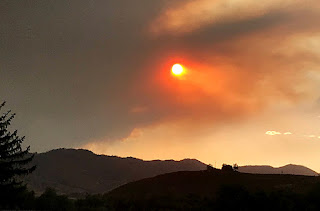For those who haven't been watching the news lately (or live outside the Midwest), the big story has been all about smoke from the Canadian forest fires pouring down into the Great Lakes region, and for the last week, into my neighborhood. It was quite a mess, but it's also one of those things that not everyone can relate to or connect with if they haven't been through some kind of similar experience. That being said, this made me think about a particular aspect of writing - communicating the strange, bizarre, and unusual to the unknowing reader.
Now, sometimes the easiest way to communicate a situation is through data. If it was hot and muggy outside, I could say it was 87 degrees out with 80% humidity. That gets the point across, but the reader is more likely to acknowledge those facts rather than feel the situation. In the case of the past few smoke-filled days, I could tell you about the Air Quality Index level, but does that really tell you how bad things were? What would a 221 AQI mean to you? Maybe you know where that rates, maybe not. However, it sure doesn't help the reader feel what it means.When we are writing about the strange and unusual, we need to get our readers to feel the experience on a deeper level. Usually, the first step in doing that is for us to try and feel what's going on. I took a walk in the smoky, 221 AQI weather (just to my car) and tried to feel what made it so bizarre. I opened my senses to it, I challenged myself to sense what was different. Within a minute, my mouth had an odd taste to it and a thin, slimy coating of ash particulate. My breathing wasn't labored, but a deep breath carried a certain weight to it, a heaviness I was not familiar with. The smell of the smoke was barely noticeable, but in a way that was the point. The air didn't reek of burnt creosote, but it smelled different. Scorched. Contaminated. It didn't feel like the air I knew.
Maybe the most bizarre part was how everything looked. People hear about these bad air alerts and expect to see rivers of smoke pouring through the streets, but it's not so obvious. In some ways it looks like an overcast day, perhaps with a little fog in the air, but it's different. The Sun isn't diving in and out of the clouds because it's just a veil of smoke - the Sun is a reddish ball obscured behind the ash. And with a little examination, the so-called foggy appearance looks more like having dust coating your glasses. The world looks tarnished and translucent. Fog has a grey, sobering feel to it, but this kind of smoke places a sepia tone on everything, interfering with the air itself. It feels different. It feels alien.
Once we experience something as close to the strange and unusual as we can, it's up to us as writers to pull out the most unusual parts of it and give those to the readers. Condense it enough so it doesn't become a long, drawn-out discussion; just give them enough to feel the grit in their mouths as the sepia-toned world passes around them in the overcast haze of foul-tasting smoke. Bring out the parts that make the world suddenly strange and different, and you will have done your job as a writer.
And one last takeaway from this. As a non-writing writer's exercise, try to spend a minute or two every day just taking in an experience in sensory detail. Feel your fingertips' sensations as they peel an orange. Watch a cloud drift across the sky, folding and churning in its own weird way. Take a moment to feel what breathing is like when you pay attention to your lungs. This kind of sensory awareness might seem very passive, but it's a great step in feeding your inner writer, which will turn these experiences into gold on the page.
And seriously - be careful in this smog. It's really bad.







